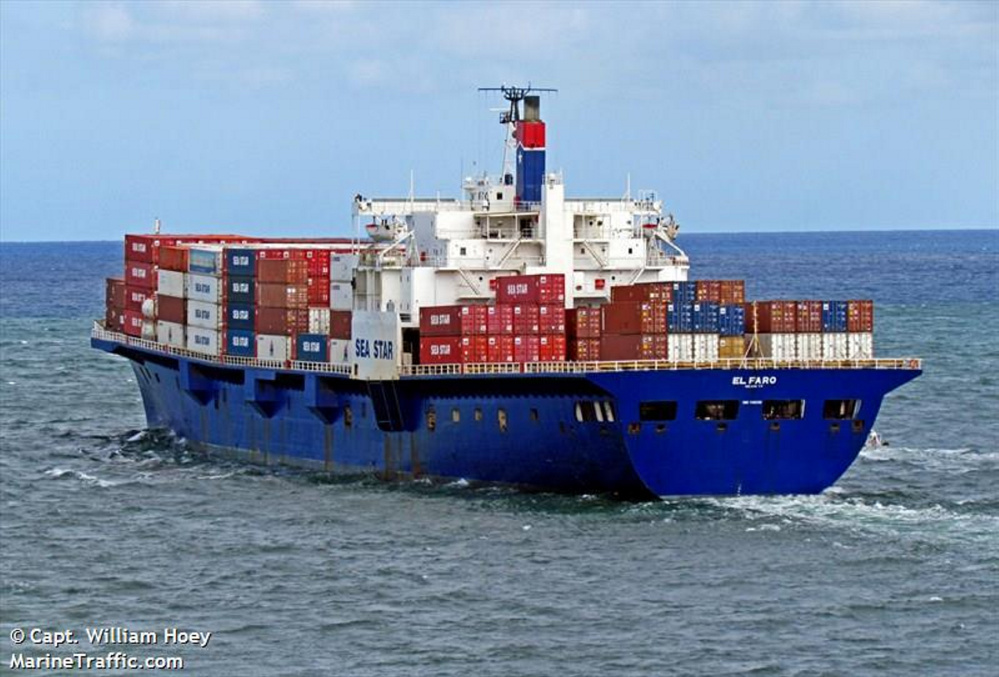A $100 million wrongful-death lawsuit filed against the owner and captain of the sunken cargo ship El Faro is likely just the beginning of a long legal process that will involve multiple parties and lead to insurance settlements, according to a Portland attorney who specializes in maritime law.
The family of El Faro crew member Lonnie Jordan filed the lawsuit Wednesday in Duval County Court in Gainesville, Florida, The Associated Press reported. It is the first legal action taken against the ship’s owner, Tote Maritime, and its captain, Michael Davidson of Windham, who died along with the other 32 merchant mariners who were overtaken by Hurricane Joaquin following a reported engine failure.
Portland maritime attorney Timothy Steigelman, who is not involved in the lawsuit, said incidents involving multiple deaths at sea often lead to complex legal processes involving many plaintiffs and lawsuits.
However, such suits rarely culminate in a jury verdict, he said. Instead, they usually lead to a combining of cases followed by negotiations over how much insurance money will be distributed to each plaintiff.
“Most likely, they’ll figure it out in one court, one way or another,” said Steigelman, an associate at Kelly, Remmel & Zimmerman.
Another recent transportation-related tragedy, the 2013 derailment and explosion of a Montreal, Maine & Atlantic freight train loaded with crude oil in Lac-Megantic, Quebec, that killed 47 people, spawned dozens of lawsuits that eventually were consolidated into a single bankruptcy case in which settlements were negotiated for each plaintiff.
Richard Dein, a retired Coast Guard commander who has appeared in court as an expert witness on marine accidents, had not yet heard about the lawsuit filed against the El Faro owner and captain but said he was not surprised.
“Any time you have loss of life, there is inevitably a lawsuit,” said Dein, who has participated in internal Coast Guard investigations of vessel incidents. “Obviously people will question the judgment of the master or captain to sail under those conditions. I don’t know the factors that went into that decision, but certainly you have to question it.”
Dein said the National Transportation Safety Board and Coast Guard investigations will examine the seaworthiness of the ship for the voyage and all communications between Davidson and Tote officials about the decision to sail. While a ship captain often has considerable latitude to make such decisions, the extent of his authority varies depending on the company, he said.
The freighter El Faro sank Oct. 1 in 15,000 feet of water east of the Bahamas. It departed from Jacksonville, Florida, carrying cars and other cargo and was en route to Puerto Rico when it lost engine power and the ability to avoid the approaching Category 4 hurricane.
“Thirty-three people didn’t have to die. Lonnie didn’t have to die,” Willie Gary, a Jacksonville attorney representing Jordan’s family, said in front of the courthouse while surrounded by the mariner’s parents and friends on Wednesday.
The suit alleges that Tote and Davidson were negligent in choosing to sail a 41-year-old cargo ship into dangerous weather. Gary said Tote needs to place more emphasis on employee safety and less on profits.
Michael Hanson, a spokesman for Tote, told the AP that the company refused to discuss individual lawsuits.
“The company remains fully focused on supporting the families and their loved ones,” he said in a statement.
Steigelman said it’s not surprising that Davidson was named in the suit, even though he is also a victim. The Merchant Marine Act of 1920, also known as the Jones Act, gives injured sailors, and by extension their families, the right to file negligence claims against ship owners, captains and even fellow crew members. If the court found Davidson personally liable, it could order damages to be paid by his estate, the attorney said.
Since he was an employee of Tote, Davidson’s actions may be deemed the company’s responsibility, Steigelman said, depending on what the evidence ultimately shows.
Commercial ship owners carry multiple types of insurance covering liability, hull damage and cargo, he said. There also are statutory limits on the amount of money a ship owner can be sued for following a disaster at sea. It is likely that Tote would invoke those limits, Steigelman said.
The lawsuit claims the decades-old ship was not fit to sail into rough seas.
The El Faro was scheduled for retirement from Caribbean duty and for new retrofitting for service between the West Coast and Alaska, company officials have said. Both the El Faro and its sister ship were set to be replaced by two new ships.
“This case is about the oldest sin known to man, and that’s greed,” Gary reportedly said. “You could’ve waited, the ship was not seaworthy and (Tote) should’ve known that, but you had to deliver cargo to get the green. And we won’t stand for it,” Gary said.
The NTSB has launched its investigation into the sinking, and is trying to work with the Navy to retrieve the vessel’s data recorder. The outcome of that investigation likely will have a bearing on the current lawsuit and any others that may be filed, the legal experts said.
Staff Writer Kevin Miller contributed to this report.
Send questions/comments to the editors.




Success. Please wait for the page to reload. If the page does not reload within 5 seconds, please refresh the page.
Enter your email and password to access comments.
Hi, to comment on stories you must . This profile is in addition to your subscription and website login.
Already have a commenting profile? .
Invalid username/password.
Please check your email to confirm and complete your registration.
Only subscribers are eligible to post comments. Please subscribe or login first for digital access. Here’s why.
Use the form below to reset your password. When you've submitted your account email, we will send an email with a reset code.